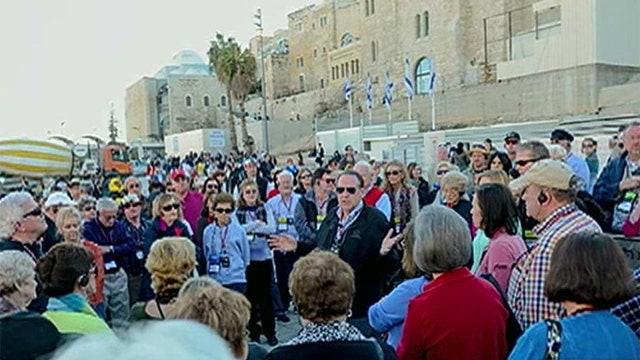Jerusalem: A spiritual awakening in the holy city
Governor Huckabee, Larry Gatlin and Ricky Skaggs discuss their visit to Israel
During the sacred week of Easter and Passover, Jerusalem’s streets are swept, sun-washed and graced by flowers of every color and fragrance, and sacred celebrations embrace both Jewish and Christian traditions, marking a season of miracles.
Ancient stories are told and retold, putting smiles on the faces of children and grownups alike, recounting freedom from enslavement, the triumph of life over death, and God’s intervention into a world of trouble.
[pullquote]
These are days when exuberant hope carries the whole city along in its excitement.
Palm Sunday saw the pathway from the Mount of Olives to the Old City teeming with joyous Christian pilgrims from all around the world, singing, chanting and waving palm fronds in remembrance of Jesus’ “Triumphal Entry” into Jerusalem.
At the same time, Jewish families and friends were arriving in Jerusalem from near and far by the tens of thousands. And at sundown on Monday, they congregated for the Seder – the deeply symbolic Passover meal that recounts the Israelites’ ancient flight from Egyptian slavery. The sounds of singing, storytelling and Bible recitation wafted from neighborhood windows.
The Passover story culminates, of course, in the miraculous parting of the Red Sea. And lest they forget the drama that led up to it, Jews continue to eat unleavened bread – matzo – for the rest of the week, recalling their hasty flight.
Meanwhile, Christians enter Holy Week reflecting on the death and resurrection of Jesus. Rituals of sorrow, repentance and loss represent myriad Orthodox, Catholic and Protestant traditions.
Then every imaginable Christian custom converges into Easter, when the miracle of the Resurrection – the cosmic triumph of life over death – is spoken and sung and shouted inside sanctuaries and echoed in the ringing of church bells across the Holy Land.
For an entire week, both Jews and Christians remember, rejoice and return to the foundations of their faiths, both of which are deeply rooted in the miraculous.
But this year, the radiance of the holidays has been darkened by violence. On Sunday, the eve of Passover, a Kansas City Jewish Center and Jewish retirement home were attacked, allegedly by a former KKK “Grand Wizard,” and three people were killed. Ironically, all of the victims were Christians. The killer’s poisonous venom sickened both communities.
Also on Sunday, Nigeria’s infamous terrorist group Boko Haram murdered at least 200 Christians in attacks on several towns in Borno State.
And on Monday, just minutes after the Jerusalem siren heralded the Passover feast, a terrorist shot and killed an Israeli father near Hebron. The victim’s family also suffered gunshot injuries, and two were hospitalized.
Despite the millennia of their survival, Jews are never allowed to forget for long the anti-Semitic hatred that shadows them. And as the most persecuted religious group in the world, Christians also face unprecedented dangers.
The 20th century saw 850,000 Jews expelled from Arab lands between 1948 and 1970. Today, fewer than 5000 Jews remain in those Muslim countries, where Christians now face the same violence, pogroms, rapes and murders that drove out the Jews. As the jihadi saying goes, “First the Saturday People, then the Sunday People.”
Not many miles to the north of Jerusalem, Hezbollah’s spiritual leader, Sheik Hassan Nasrallah, has summed up his malignant worldview: "We have discovered how to hit the Jews where they are the most vulnerable. The Jews love life, so that is what we shall take away from them. We are going to win because they love life and we love death.”
But we “People of the Book” share a happier alternative. In the words of Moses, “… I have set before you life and death, blessings and curses. Now choose life, so that you and your children may live.” (Deut. 30:19)
It is true that Christians and Jews have significant religious disparities, and for the sake of mutual respect, we sometimes have to agree to disagree. Meanwhile, the tragic history of pogroms and anti-Semitic abuses, in the name of Christianity, has led to widespread mistrust.
But these days, we are learning to find common ground and to stand together on it. And it’s about time we did.
When Christians contemplate the oft-painted “Last Supper,” they don’t always recognize that it was a Seder, shared on the eve of Passover. Jesus broke the bread, blessed the wine, and at the end, as traditional Jews always do, he and his friends sang a hymn before they went out – to a Roman crucifixion.
For millennia, people have discovered and deepened friendships around dinner tables. And during this sacred season, Jews and Christians are sitting down together simply to break bread, enjoy good company, and invoke God’s blessing on one another.
Because, in reality, we are natural allies in an increasingly dangerous world. And we have good reason to join forces.
For one thing, whatever our challenges, we have not forgotten how to pray.
For another, when in comes to matters of life and death, we can count on each other to choose life.
And most important of all, we still believe in miracles.









































